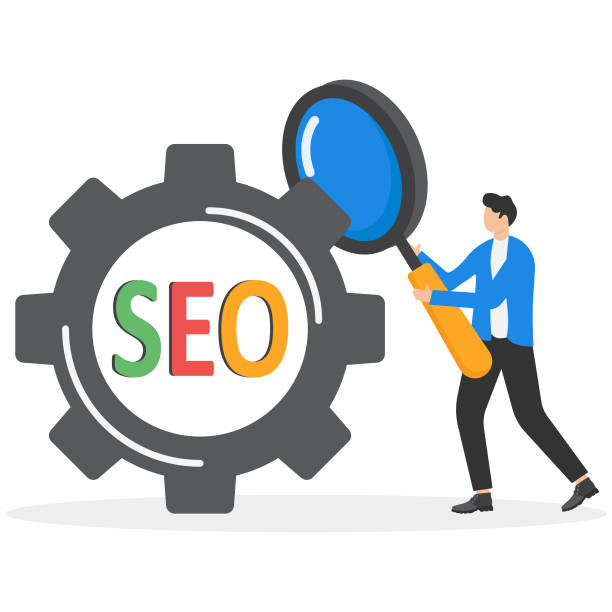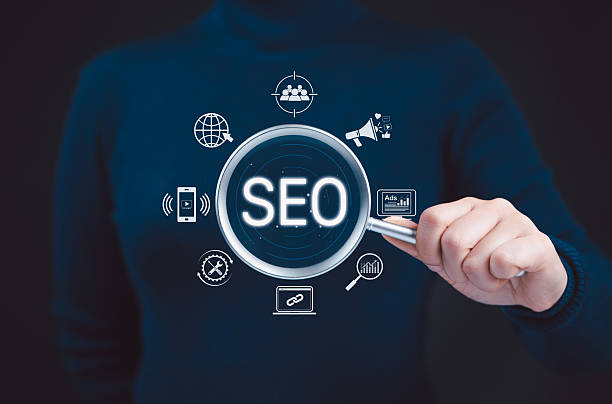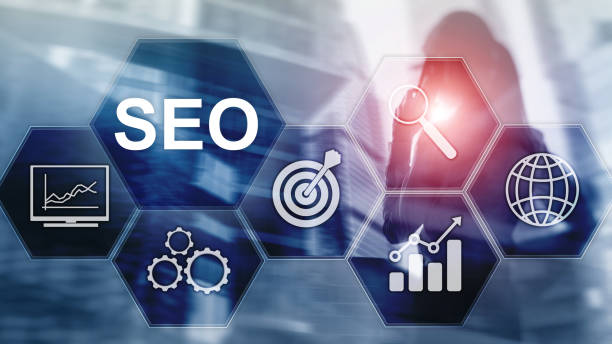What is Off-Page SEO and Why is it Crucial for Your Online Success?
#Off_page_SEO, also known as off-page SEO, is a set of activities and methods that you perform outside your website to improve its ranking in search engines.
Unlike on-page SEO, which focuses on content and structure within the site, off-page SEO emphasizes building credibility, trust, and popularity for your website in the eyes of search engines.
The most important aspect of off-page SEO is backlinks; links given to your site from other websites.
Google and other search engines consider these backlinks as “votes of confidence” or “recommendations” from other reputable sources.
The more numerous and higher quality these links are, the more your site’s Domain Authority increases, which directly impacts your ranking in search results.
In this section, a comprehensive explanation is provided so that you, as a user, gain a complete understanding of the importance of this topic.
A successful off-page SEO campaign can significantly increase your organic traffic and solidify your position in your industry.
This is an educational topic for everyone who wants to have a stronger online presence.
Ignoring off-page SEO means losing a large part of your site’s growth potential, because without external signals, search engines cannot fully trust a website and present it as a reliable source.
Are you worried about losing customers because you don’t have a professional e-commerce website?
With e-commerce website design by Rasawp, forget these worries!
✅ Significant increase in sales and conversion rate from visitor to customer
✅ Professional and user-friendly design that builds customer trust
⚡ Get free consultation from Rasawp
Key Components of Off-Page SEO and Their Role in Increasing Site Authority
To fully understand how off-page SEO works, we need to become familiar with its key components.
At the top of these components is Link Building, which is known as the backbone of off-page SEO.
This process involves acquiring links from other sites to your website.
But off-page SEO goes beyond just links; Brand Mentions without direct links have also gained increasing importance.
When your brand or website name is mentioned in articles, news, or social networks, even without a hyperlink, Google can consider it as a positive signal of your reputation and credibility.
Social Signals, such as shares, likes, and comments on platforms like Twitter, Facebook, and LinkedIn, also indirectly influence rankings.
These signals show search engines that your content is popular and engaging, which can help increase your traffic and visibility.
Online reviews and feedback on various websites and platforms also play an important role, especially for local businesses.
All these components, hand in hand, help search engines assess the credibility and trust of a website and assign it an appropriate position in search results.
Understanding and applying these elements professionally is essential for every SEO specialist.
The ultimate goal is to increase your site’s overall visibility and credibility in the online space, which is possible with a comprehensive off-page SEO strategy.
Types of Backlinks and Their Quality Assessment in Off-Page SEO Strategy
The quality of backlinks in an off-page SEO strategy is far more important than their quantity.
Backlinks can differ in quality and type, and each has a different impact on your ranking.
The main classification is between “Dofollow” (Dofollow) and “Nofollow” (Nofollow) backlinks.
Dofollow links allow search engines to pass “authority” (Link Juice) from the source site to your site, while Nofollow links block this transfer of authority.
Although Nofollow links do not directly affect domain authority, they can still generate referral traffic and help diversify your link profile.
Other types of backlinks include Sponsored links, User-Generated Content (UGC) links, and Internal Links (though these are mostly related to on-page SEO).
To assess the quality of a backlink, several factors must be considered: the domain authority of the referring site, topical relevance between the two sites, placement of the link within relevant and natural content, and diversity in anchor texts.
Links coming from reputable and relevant sites within your industry have a much higher value.
This analytical approach helps you optimize your backlink sources.
| Backlink Type | Description | Importance in Off-Page SEO |
|---|---|---|
| Dofollow | Transfers authority from the source site to the destination site. Search engines follow these links. |
High (Increases Domain Authority) |
| Nofollow | Does not directly transfer authority. Search engines may not follow these links. |
Medium (Referral traffic, profile diversity) |
| Sponsored | Paid links that should be marked with rel=”sponsored”. | Medium (No direct authority transfer) |
| User-Generated Content (UGC) | Links created by users (e.g., comments, forums) and should have rel=”ugc”. | Medium (Traffic, naturalness signal) |
Effective Methods for Acquiring High-Quality Backlinks and Boosting Off-Page SEO
Acquiring high-quality backlinks is a complex but vital process for improving off-page SEO.
One of the most effective methods is Guest Posting.
In this method, you write valuable content for another website in your related field and, in return, receive one or more links to your site.
This not only creates backlinks but also helps you reach new audiences and increase your credibility as an expert.
Click here to preview your posts with PRO themes ››
Another method is Broken Link Building.
You scan relevant sites to find broken links that lead to 404 content.
Then, you contact the site administrator and offer that you have similar content on your site that could replace that broken link.
This is a win-win situation; you get a backlink, and the other website fixes its broken link.
The Skyscraper Technique also involves finding popular and high-performing content in your niche, then creating content that is even better and more comprehensive than it, and finally contacting websites that had linked to the original content to link to your improved version.
Providing detailed, step-by-step guidance in these areas can be very useful.
Also, creating linkable assets that are naturally shared and linked to by others is a long-term and sustainable strategy for off-page SEO.
Focusing on the quality and relevance of links is the key to success in this part of SEO.
Are you tired of losing business opportunities due to not having a professional corporate website?
Rasawp helps you with professional corporate website design:
✅ Build a powerful and reliable image for your brand
✅ Convert website visitors into loyal customers
⚡ Get a free consultation now!
The Impact of Social Signals and Brand Mentions on Off-Page SEO Optimization
While backlinks play a pivotal role in off-page SEO, social signals and brand mentions are increasingly influencing website credibility and visibility.
Search engines like Google seek to understand how much a brand or website is discussed and noticed in the online space.
Social signals, including shares, likes, comments, and the level of engagement with content on platforms like Instagram, Facebook, Twitter, and LinkedIn, although not directly considered as ranking factors, can indirectly impact off-page SEO.
How? Increased social media engagement can lead to increased brand awareness, which, in turn, increases the likelihood of your content being seen and acquiring natural backlinks.
Furthermore, Brand Mentions, even without a direct link, are considered a signal of popularity and credibility.
If your brand name is frequently mentioned in news articles, blogs, or forums, Google can interpret it as a positive sign of trust and reputation.
This part of off-page SEO requires a precise analysis to best understand how users interact with the brand and content.
Promoting content on social networks and being active on these platforms is a complementary and essential strategy for strengthening your off-page SEO and should not be underestimated.
This indicates that off-page SEO is not limited to link-building alone but encompasses a complete ecosystem of credibility signals.
Negative SEO and Protecting Site Authority Against Malicious Attacks
Negative SEO refers to malicious actions performed by competitors or ill-wishers with the aim of reducing a website’s ranking in search engines.
These attacks can include spammy and low-quality link building to your site, removal of your high-quality links, Content Scraping, or even cyberattacks.
Detecting and combating negative SEO is a specialized and very important aspect of off-page SEO management.
The first step is continuous monitoring of your site’s backlink profile.
By using reputable SEO tools, you can identify new and suspicious backlinks.
If you notice a sudden and unnatural increase in low-quality links to your site, this is a serious red flag.
To counteract this, you can use Google’s Disavow Links tool in Google Search Console.
This tool allows you to tell Google that you do not want specific links to be considered in calculating your site’s ranking.
This is crucial guidance for protecting the SEO health of your site.
Also, protecting your content from theft and monitoring mentions of your brand name online is important.
A strong defensive strategy in off-page SEO requires continuous updating of your knowledge about the latest negative SEO attack methods and the tools to combat them.
This is important news for every webmaster who should always be vigilant.
Key Tools and Metrics for Monitoring and Analyzing Off-Page SEO
For success in off-page SEO, continuous monitoring and analysis of your site’s backlink profile and external signals are essential.
Fortunately, powerful tools are available to help you track your performance and identify new opportunities.
Tools like Ahrefs, SEMrush, and Moz are among the most popular options for backlink analysis.
These tools allow you to view the number of incoming links, referring domains, anchor texts, and the Domain Authority/Rating of linking sites.
Google Search Console is also a free and vital tool that provides information about incoming links to your site and any Manual Actions from Google.
Click here to preview your posts with PRO themes ››
Key metrics to pay attention to include: the number of Referring Domains, which indicates the number of unique websites that have linked to you (more qualitative than just the number of links); Domain Authority (DA/DR) score, which indicates the overall strength of your site; and anchor text diversity, which should be natural and align with your target keywords.
This section requires a deep analytical approach to continuously optimize your off-page SEO strategy and stay ahead of competitors.
Correct use of these tools can provide clear insight into your current off-page SEO status.
| Tool Name | Key Features for Off-Page SEO | Key Application |
|---|---|---|
| Ahrefs | Complete competitor backlink analysis, finding link-building opportunities, monitoring new and lost backlinks. | Competitor analysis and finding link-building opportunities |
| SEMrush | Backlink profile review, identification of toxic links, link-building opportunities with Backlink Gap. | Discovering toxic links and finding backlink gaps |
| Moz Pro | Link analysis, domain review using Domain Authority (DA) and Page Authority (PA). | Measuring domain and page authority |
| Google Search Console | Incoming links report, Disavow tool, Google manual actions review. | Monitoring incoming links and managing toxic links (Disavow) |
Measuring Success and Key Metrics for Evaluating Off-Page SEO Performance
After implementing off-page SEO strategies, measuring success and evaluating performance are crucial.
This process helps you gauge the effectiveness of your efforts and adjust your strategies if necessary.
One of the most important success metrics is organic traffic growth.
An increase in visitors from search engines indicates an improvement in your position for target keywords.
Another metric is improved keyword rankings.
Monitoring the position of your main keywords in search results shows you whether your off-page SEO strategy is increasing your site’s visibility for relevant searches.
Changes in Domain Authority (DA/DR) and Page Authority (PA/PR) are also important indicators directly affected by off-page SEO activities.
An increase in these metrics means an increase in your site’s trust and authority in the eyes of search engines.
Additionally, examining Referral Traffic from incoming links and the associated conversion rate can provide clear insight into the true value of your backlinks.
An analytical and data-driven approach to evaluation ensures that your resources and time are effectively invested in off-page SEO.
These evaluations provide you with guidance on which tactics yield the most return and where improvement is needed.
Did you know that poor online store design can drive away up to 70% of your potential customers? Rasawp transforms your sales with professional and user-friendly e-commerce website design.
✅ Significant increase in sales and revenue
✅ Full optimization for search engines and mobile
⚡ [Get free consultation from Rasawp]
Common Mistakes in Off-Page SEO and How to Avoid Them
Despite the importance of off-page SEO, there are common mistakes that can harm your efforts and even lead to Google penalties.
One of the biggest mistakes is buying low-quality and spammy backlinks.
Google severely penalizes link-building schemes intended to manipulate rankings.
Unnatural backlinks from irrelevant sites, with high spam scores, or from Private Blog Networks (PBNs), can seriously damage your SEO.
Instead of focusing on quantity, always emphasize the quality and relevance of links.
Another mistake is ignoring topical relevance.
Links coming from sites completely unrelated to your field of activity have little value and may even appear suspicious.
Always look for links from sites with content relevant to your business.
Over-optimization by excessively using a specific anchor text can also send negative signals to Google.
Your anchor text profile should be natural and diverse, including brand names, naked URLs, and various keywords.
Lack of diversity in backlink sources and relying on one or two types of sources (e.g., only guest posting) is also a mistake.
The best off-page SEO strategy is a combination of different tactics to acquire links from various reputable sources.
Finally, lack of regular monitoring of your backlink profile can make you vulnerable to negative SEO.
These are important guidelines that you should pay attention to for maintaining the health of your site’s off-page SEO.
By avoiding these mistakes, you can implement a sustainable and effective off-page SEO strategy.
The Future of Off-Page SEO and New Trends in Building Online Authority
The world of SEO is constantly evolving, and off-page SEO is no exception.
In the future, it can be expected that the emphasis on brand authority and trust signals will increase even further.
Google’s algorithms are becoming smarter and more capable of distinguishing natural links from unnatural ones.
This means that focusing on creating truly valuable and shareable content that naturally attracts links will become even more crucial.
Google’s algorithms are increasingly looking for E-A-T (Expertise, Authoritativeness, Trustworthiness), and off-page SEO plays a significant role in proving this.
Click here to preview your posts with PRO themes ››
Brand mentions without direct links, collaborations with influencers, and digital public relations activities to increase brand visibility and reputation will become even more powerful tools in off-page SEO.
Also, artificial intelligence will play a more prominent role in analyzing links, identifying spam patterns, and even predicting future SEO trends.
These aspects make the topic engaging yet challenging.
Off-page SEO in the future will require even more specialization and comprehensiveness; not just link building, but building a powerful and reputable online presence that search engines can trust.
Survival in this field necessitates continuous adaptation to changes and innovation in link-building and branding approaches.
Frequently Asked Questions
| Row | Question | Answer |
|---|---|---|
| 1 | What is Off-Page SEO? | Off-Page SEO refers to a set of actions performed outside your website to improve its ranking in search engines. These actions include backlink building, social media presence, branding, and so on. |
| 2 | Why is Off-Page SEO of high importance? | Off-Page SEO shows search engines that your website is reputable, popular, and trustworthy. High-quality backlinks from authoritative sites are strong signals for better ranking and help increase your domain authority. |
| 3 | What are the most important components of Off-Page SEO? | The most important components of Off-Page SEO include: Link Building, Content Marketing, Social Media Marketing, Influencer Marketing, and Online Reputation Management. |
| 4 | What is a backlink and why is it important for Off-Page SEO? | A backlink is a link from another website pointing to your website. These links act as “votes of confidence” in Google’s eyes and indicate the credibility of your content. The more numerous and higher quality the backlinks, the better your site’s ranking will be. |
| 5 | What are the types of backlinks in terms of SEO impact? | The two main types of backlinks are DoFollow and NoFollow. DoFollow backlinks pass authority (Link Juice) and directly impact ranking. NoFollows do not pass authority but can still generate traffic and help make the link profile appear natural. (Also UGC and Sponsored) |
| 6 | How can one create high-quality backlinks for their site? | To build high-quality backlinks, one can use methods such as: creating excellent and shareable content, Guest Posting on relevant and authoritative sites, Broken Link Building, Digital PR, and competitor backlink analysis. |
| 7 | What are Toxic Backlinks and how do they affect a site? | Toxic or spam backlinks are links from low-quality, spammy, or irrelevant websites pointing to your site. These backlinks can harm your site’s ranking and even lead to penalties by Google’s algorithms. |
| 8 | What is the role of social media in Off-Page SEO? | Although social signals (likes, shares, etc.) are not direct ranking factors, they contribute to off-page SEO. They increase content visibility, drive direct traffic to the site, and ultimately increase the chance of acquiring natural backlinks and improving brand recognition. |
| 9 | What is the importance of diversity in the backlink profile? | Diversity in the backlink profile means that your links come from various sources (blogs, forums, news sites, directories), with diverse anchor texts, and a mix of DoFollow and NoFollow links. This diversity signals to Google that your link building is natural and organic. |
| 10 | What are the common mistakes in Off-Page SEO that should be avoided? | Common mistakes include: buying a high volume of low-quality backlinks, over-optimization with target keywords, neglecting quality over quantity in backlink building, lack of diversity in the link profile, and ignoring toxic backlinks and not disavowing them. |
And other services of Rasawp Advertising Agency in the field of advertising
Smart Custom Software: Designed for businesses seeking to analyze customer behavior through optimizing key pages.
Smart PR (Advertorials): A quick and efficient solution for campaign management focusing on custom programming.
Smart PR (Advertorials): A dedicated service for growing user engagement based on real data.
Smart Link Building: A dedicated service for improving SEO ranking based on Google Ads management.
Smart Direct Marketing: A quick and efficient solution for user engagement with a focus on SEO-driven content strategy.
And over hundreds of other services in the field of internet advertising, advertising consultation, and organizational solutions
Internet Advertising | Advertising Strategy | Advertorials
Resources
Digikala Magazine
Roshd Site
ISNA News Agency
Virgool
? Are you ready to grow your business in the digital world? Rasawp Afarin Digital Marketing Agency, by providing comprehensive and innovative solutions including website design with a modern user interface and targeted marketing strategies, paves your way to success.
📍 Tehran, Mirdamad Street, next to Bank Markazi, Kazeroon Jonoubi Alley, Ramin Alley, No. 6













